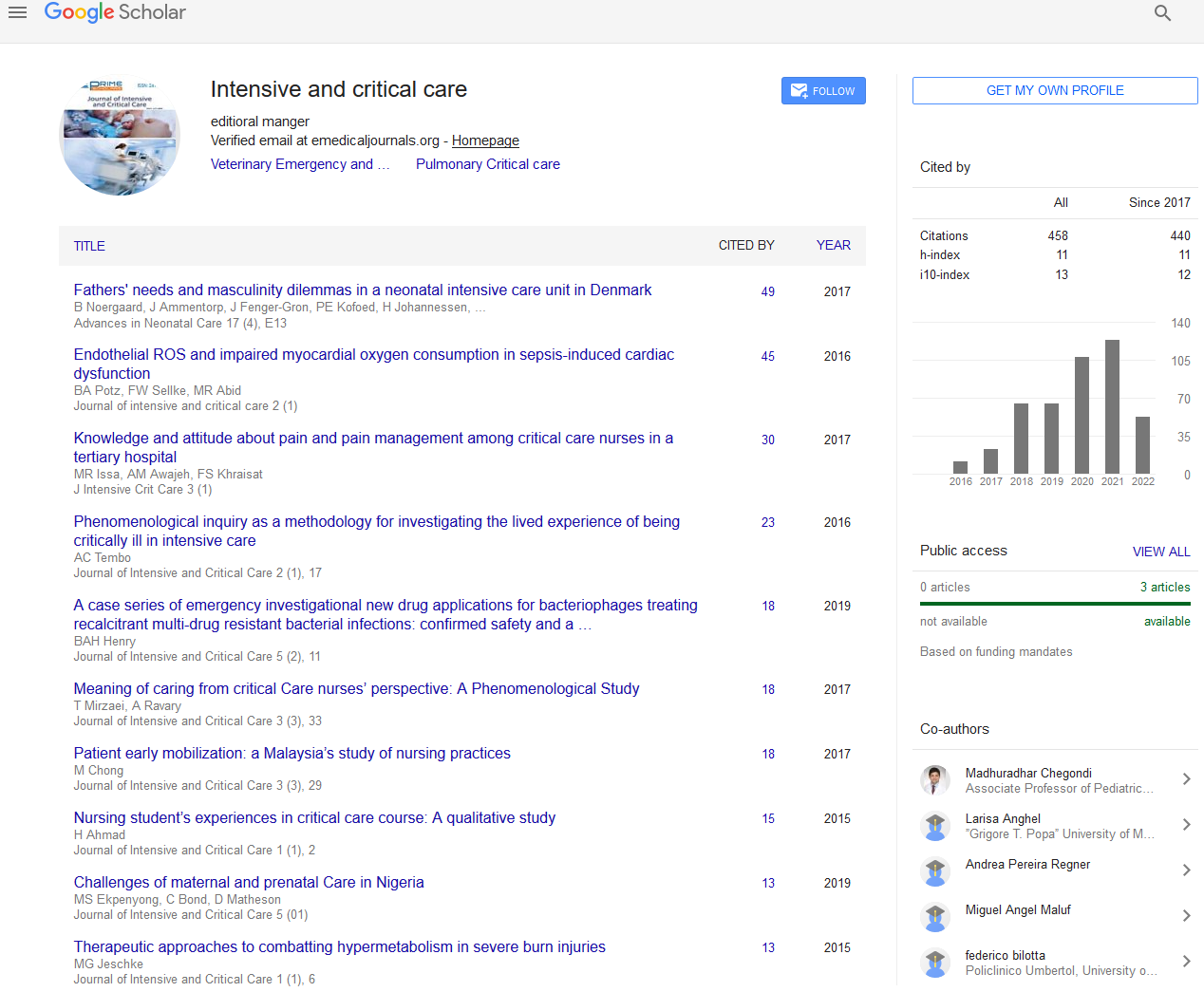Short Communication - (2023) Volume 9, Issue 6
Profound Learning Based Procedures for Neuro-degenerative Clutters Discovery
Elvira Pirondini*
Department of Physical Medicine and Rehabilitation, University of Pittsburgh, USA
*Correspondence:
Elvira Pirondini,
Department of Physical Medicine and Rehabilitation, University of Pittsburgh,
USA,
Email:
Received: 29-Nov-2023, Manuscript No. IPJICC-23-18677;
Editor assigned: 01-Dec-2023, Pre QC No. IPJICC-23-18677 (PQ);
Reviewed: 15-Dec-2023, QC No. IPJICC-23-18677;
Revised: 20-Dec-2023, Manuscript No. IPJICC-23-18677 (R);
Published:
27-Dec-2023, DOI: 10.35248/2471-8505-9.6.52
Introduction
The establishment of neuro critical care units has driven advancements
in neuroscience and the understanding of neurological
disorders. These units often participate in clinical trials
and research, contributing to the development of innovative
treatments and therapies. Neuro critical care units also serve as
centres for education and training. They provide opportunities
for medical professionals to gain specialized expertise in neuro
critical care, ensuring a growing pool of skilled practitioners.
While the benefits of neuro critical care are evident, the field
also faces challenges, including the shortage of specialized
neurointensivists and the need for greater access to neuro critical
care services, especially in rural areas. Additionally, ongoing
research is essential to further improve patient outcomes and
expand the scope of conditions that can be effectively treated
through neuro critical care. Neuro critical care is a vital and
evolving field in medicine that offers numerous benefits to patients
suffering from severe neurological conditions. Through
timely diagnosis, expert care, individualized treatment plans,
and a focus on preventing secondary brain injury, neuro critical
care units play a crucial role in enhancing patient recovery,
improving survival rates, and ultimately providing patients with
a better quality of life [1,2]. As the field continues to advance,
we can expect even greater improvements in the care and outcomes
for individuals facing critical neurological illnesses.
Description
Interventions such as surgery or invasive monitoring can lead
to complications, including infections, bleeding, or further
damage to the brain. These risks must be carefully weighed
against the potential benefits of treatment. Families and caregivers
of neuro critical care patients face immense challenges.
The physical and emotional toll of caregiving can be overwhelming.
Additionally, navigating complex medical decisions
and advocating for the best interests of the patient can be a
daunting responsibility. Neuro critical care plays a vital role in
the treatment of patients with severe neurological conditions,
offering the potential for improved outcomes and quality of
life. However, it is essential to recognize and address the drawbacks
associated with this field. Ethical dilemmas, high costs,
limited access, prolonged hospitalization, risk of infections, uncertainty
in prognosis, limited therapeutic options, psychological
impact, risk of complications, and the burden on caregivers
are all significant issues that deserve attention [3,4]. As medical
science continues to advance, it is crucial for healthcare professionals,
policymakers, and society to work together to mitigate
these drawbacks and ensure that neuro critical care remains
a field that provides the best possible care for patients while
addressing the associated challenges.
Conclusion
Achieving a balance between the benefits and drawbacks of
neuro critical care is essential in improving patient outcomes
and the overall well-being of individuals and their families
facing critical neurological illnesses. Cardiac Critical Care is a
dynamic and essential field of medicine that offers numerous
benefits for individuals with severe heart conditions. Through
early intervention, multidisciplinary teamwork, advanced technologies,
and a focus on reducing mortality rates, Cardiac Critical
Care has become a lifeline for countless patients and their
families. Its role in improving the quality of life for those with
cardiac issues cannot be overstated, and the dedicated professionals
in this field continue to make a profound difference in
the lives of their patients.
Acknowledgement
None.
Conflict Of Interest
The author’s declared that they have no conflict of interest.
References
- Garcia LD, Kotzian BJ, Yang J, Mwangi B, Cao B, et al. (2017) The impact of machine learning techniques in the study of bipolar disorder: A systematic review. Neurosci Biobehav Rev. 80:538-554.
[Crossref] [Google Scholar] [PubMed]
- Loh HW, Ooi CP, Barua PD, Palmer EE, Molinari F, et al. (2022) Automated detection of ADHD: Current trends and future perspective. Comput Biol Med. 146:105525.
[Crossref] [Google Scholar] [PubMed]
- Mao Z, Su Y, Xu G, Wang X, Huang Y, et al. (2019) Spatio-temporal deep learning method for ADHD fMRI classification. Inform Sci. 499:1-11.
[Crossref] [Google Scholar]
- Miller CJ, Klugman J, Berv DA, Rosenquist KJ, Ghaemi SN (2004) Sensitivity and specificity of the mood disorder questionnaire for detecting bipolar disorder. J Affect Disord. 81(2):167-171.
[Crossref] [Google Scholar] [PubMed]
Citation: Pirondini E (2023) Profound Learning based Procedures for Neuro-degenerative Clutters Discovery. J Intensive Crit Care. 9:52.
Copyright: © 2023 Pirondini E. This is an open-access article distributed under the terms of the Creative Commons Attribution License, which permits unrestricted use, distribution, and reproduction in any medium, provided the original author and source are credited.

